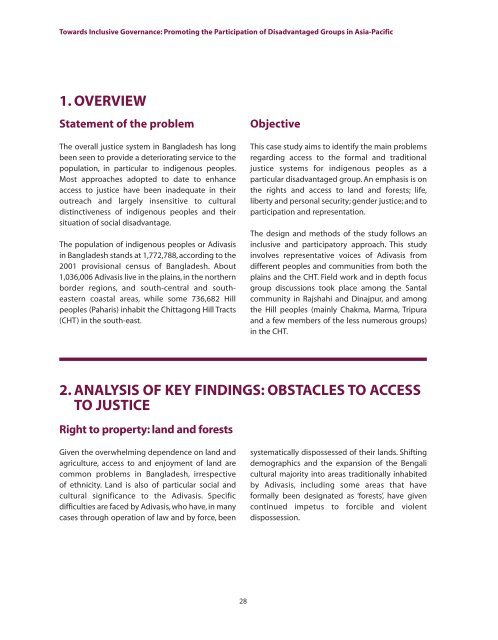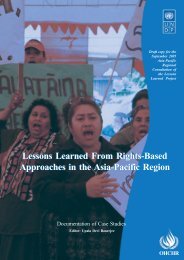Towards Inclusive Governance: Promoting the Participation of Disadvantaged Groups in Asia-Pacific1. OVERVIEWStatement of the problemThe overall justice system in Bangladesh has longbeen seen to provide a deteriorating service to thepopulation, in particular to indigenous peoples.Most approaches adopted to date to enhanceaccess to justice have been inadequate in theiroutreach and largely insensitive to culturaldistinctiveness of indigenous peoples and theirsituation of social disadvantage.The population of indigenous peoples or Adivasisin Bangladesh stands at 1,772,788, according to the2001 provisional census of Bangladesh. About1,036,006 Adivasis live in the plains, in the northernborder regions, and south-central and southeasterncoastal areas, while some 736,682 Hillpeoples (Paharis) inhabit the Chittagong Hill Tracts(CHT) in the south-east.ObjectiveThis case study aims to identify the main problemsregarding access to the formal and traditionaljustice systems for indigenous peoples as aparticular disadvantaged group. An emphasis is onthe rights and access to land and forests; life,liberty and personal security; gender justice; and toparticipation and representation.The design and methods of the study follows aninclusive and participatory approach. This studyinvolves representative voices of Adivasis fromdifferent peoples and communities from both theplains and the CHT. Field work and in depth focusgroup discussions took place among the Santalcommunity in Rajshahi and Dinajpur, and amongthe Hill peoples (mainly Chakma, Marma, Tripuraand a few members of the less numerous groups)in the CHT.2. ANALYSIS OF KEY FINDINGS: OBSTACLES TO ACCESSTO JUSTICERight to property: land and forestsGiven the overwhelming dependence on land andagriculture, access to and enjoyment of land arecommon problems in Bangladesh, irrespectiveof ethnicity. Land is also of particular social andcultural significance to the Adivasis. Specificdifficulties are faced by Adivasis, who have, in manycases through operation of law and by force, beensystematically dispossessed of their lands. Shiftingdemographics and the expansion of the Bengalicultural majority into areas traditionally inhabitedby Adivasis, including some areas that haveformally been designated as ‘forests’, have givencontinued impetus to forcible and violentdispossession.28
Access to justice for indigenous peoples: a case study of BangladeshGiven the operation of different legal frameworksin each case, issues regarding rights to land andforests are discussed separately below for the CHTand the plains, respectively.LandChittagong Hill TractsThe applicable statutory laws in the CHT recognize thecustomary rights of Adivasis to land and resourcesto a considerable extent. The traditional rights ofthe Hill people, which are expressly recognized,include to ‘occupy’ homestead land (Rule 50, CHTRegulation) and to use timber, bamboo and other‘minor forest resources’ for domestic purposeswithout obtaining prior permission from the DC(Forest Act, 1927; CHT Forest Transit Rules, 1973).Other such rights are indirectly acknowledged bythe CHT Regulation, such as the right to engage inswidden (jum) cultivation (Rule 41, CHT Regulation)and to use forest resources for domestic purposes(Rule 41A, CHT Regulation). However, othercustomary rights, e.g. over hunting and the use ofwater resources, lack explicit legal recognition.Under the CHT Regulation, the DeputyCommissioner (DC) was responsible for landadministration and, unlike the practice in otherregions, was obliged to consult with headmenbefore making any settlement (freehold grant) ofland and providing permission for transfer of landownership (Rule 34 of the CHT Regulation). In casesof leasehold grants of land above a specifiedamount, the National Board of Revenue (and nowthe Board of Land Administration) had residuarypowers.The protection scheme of Adivasi land rights, asprovided by the CHT Regulation, came undersevere assault over subsequent years through bothlegal and practical measures, with many Paharis 1being dispossessed of their lands, including ploughlands, and being compelled to give up traditionaljum cultivation. The most severe acts ofdispossession included the appropriation of forestlands by the colonial Forest Department, thecommissioning of the Kaptai hydro-electric dam in1960, the leasing of lands to non-Adivasis forcommercial and residential purposes, and theGovernment’s policy (from 19791982 in particular)of systematic resettlement of Bengalis from theplains in the CHT.Significant changes in the legal frameworkfacilitated the process of leasing lands andresettling people. In 1971, the CHT Regulation wasamended to reduce the freehold grant to residentfarmers from 25 acres to 10 acres, followed byanother amendment in 1979, to further waterdown restrictions against the acquisition of landrights by non-residents.These latest changes paved way for theGovernment of Bangladesh to settle some 200,000-400,000 landless Bengalis within the region. Thesettlers were provided with a parcel of land (whichthough treated as ‘khas’ or government-ownedland was in fact often traditional commons,homesteads, or individually or collectively-usedfarmlands of the Adivasis) and with an initial cashpayment, cattle, housebuilding materials andregular ‘rations’.1Paharis or Hill people is the term used in Bangladesh to describe indigenous peoples living in the Chittagong Hill Tracts. It is used to distinguish themfrom people residing in the plains.29



